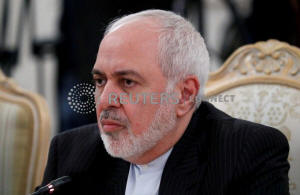Iran accuses Europe of yielding to 'high school bully' Trump in nuclear
row
 Send a link to a friend
Send a link to a friend
 [January 16, 2020]
By Parisa Hafezi and John Irish [January 16, 2020]
By Parisa Hafezi and John Irish
DUBAI/PARIS (Reuters) - Iran said on
Thursday three European states had succumbed to "high school bully"
Donald Trump when they triggered a dispute mechanism in a nuclear pact
the U.S. president opposes, a step that could eventually lead to
reimposing U.N. sanctions.
The pact, known as the JCPoA, was agreed in 2015 between Tehran and
world powers, offering Iran sanctions relief if it curbed its nuclear
work. Trump withdrew from the deal in 2018 and reimposed U.S. sanctions,
saying he wanted a tougher deal.
Iran has responded by scaling back its compliance with terms of the
pact, saying this month it rejected all limits on uranium enrichment,
although it says it wants to keep the deal in place.
Britain, France and Germany triggered the accord's dispute mechanism
this week. London said it was now time for a "Trump deal" to replace it,
while Paris said broad talks were needed.

The Washington Post reported on Wednesday that Washington had threatened
to impose a 25% tariff on European automobile imports if the three
European capitals did not formally accuse Iran of breaking the nuclear
agreement.
"Appeasement confirmed. E3 sold out remnants of #JCPOA to avoid new
Trump tariffs. It won't work my friends. You only whet his appetite.
Remember your high school bully?" Iranian Foreign Minister Mohammad
Javad Zarif wrote on Twitter.
Two European diplomats confirmed Washington had threatened tariffs but
said leaders of the three European states had already decided to trigger
the mechanism before that.
Another diplomat said Washington risked "discrediting the Europeans, but
then Trump doesn’t really care about that," adding a U.S. threat to
impose tariffs on the Europeans would send a message to Iran that only
Washington mattered.
The European Union said on Thursday its top diplomat, Josep Borrell,
held "frank" talks with Zarif on the sidelines of a conference in New
Delhi.
'SNAPPING BACK'
The Europeans have long opposed Trump's decision to withdraw from the
nuclear deal. The dispute mechanism begins a diplomatic process that can
end with U.N. sanctions on Iran "snapping back" into place, although the
Europeans say that is not their aim.
In announcing the launch of the dispute mechanism, the European powers
said they were not backing a U.S. policy of "maximum pressure" on Iran,
and they hoped to save the accord.
[to top of second column]
|

Iran's Foreign Minister Mohammad Javad Zarif looks on during a
meeting with Russia's Foreign Minister Sergei Lavrov, in Moscow,
Russia December 30, 2019. REUTERS/Evgenia Novozhenina/File Photo

The nuclear dispute lies at the heart of Iran's long-running
standoff with the West that spiraled into open conflict this month
when Washington killed an Iranian general in Baghdad and Tehran
responded with missile strikes on U.S. targets in Iraq.
While on alert for U.S. reprisals, Iran shot down a civilian
airliner by mistake, triggering days of anti-government protests at
home. Anger at the state has continued at victims' funerals.
"Death to the dictator," mourners shouted as they buried two victims
of the plane disaster in the city of Sanandaj on Thursday, videos
posted online showed, referring to Iran's top authority, Supreme
Leader Ayatollah Ali Khamenei.
Facing unrest at home and pressure from abroad, Khamenei will
deliver a sermon at prayers on Friday, the first time he has
addressed the prominent weekly gathering in eight years.
U.S. sanctions have added to the Iran's challenges, driving up
prices as the currency crumbles in value.
"Pressure has increased on Iran but we continue to progress,"
President Hassan Rouhani said on Thursday, adding Iran was now
enriching more uranium than before the 2015 deal.
Enriched uranium can be used to create material for nuclear
warheads. Iran denies Western accusations it wants such weapons and
says it wants nuclear material for peaceful purposes.
The U.S. administration has said a new deal should not only cover
Iran's nuclear program but also its development of ballistic
missiles and activities in the region, where it wields influence via
allied militias in Iraq, Syria, Lebanon and Yemen.
Iran has repeatedly said it will not talk with sanctions in place.
It has also said it cannot negotiate with Trump who broke U.S.
promises by abandoning the previous deal.

(Reporting by Parisa Hafezi in Dubai and John Irish in Paris;
Writing by Edmund Blair; Editing by Peter Graff)
[© 2020 Thomson Reuters. All rights
reserved.] Copyright 2020 Reuters. All rights reserved. This material may not be published,
broadcast, rewritten or redistributed.
Thompson Reuters is solely responsible for this content. |